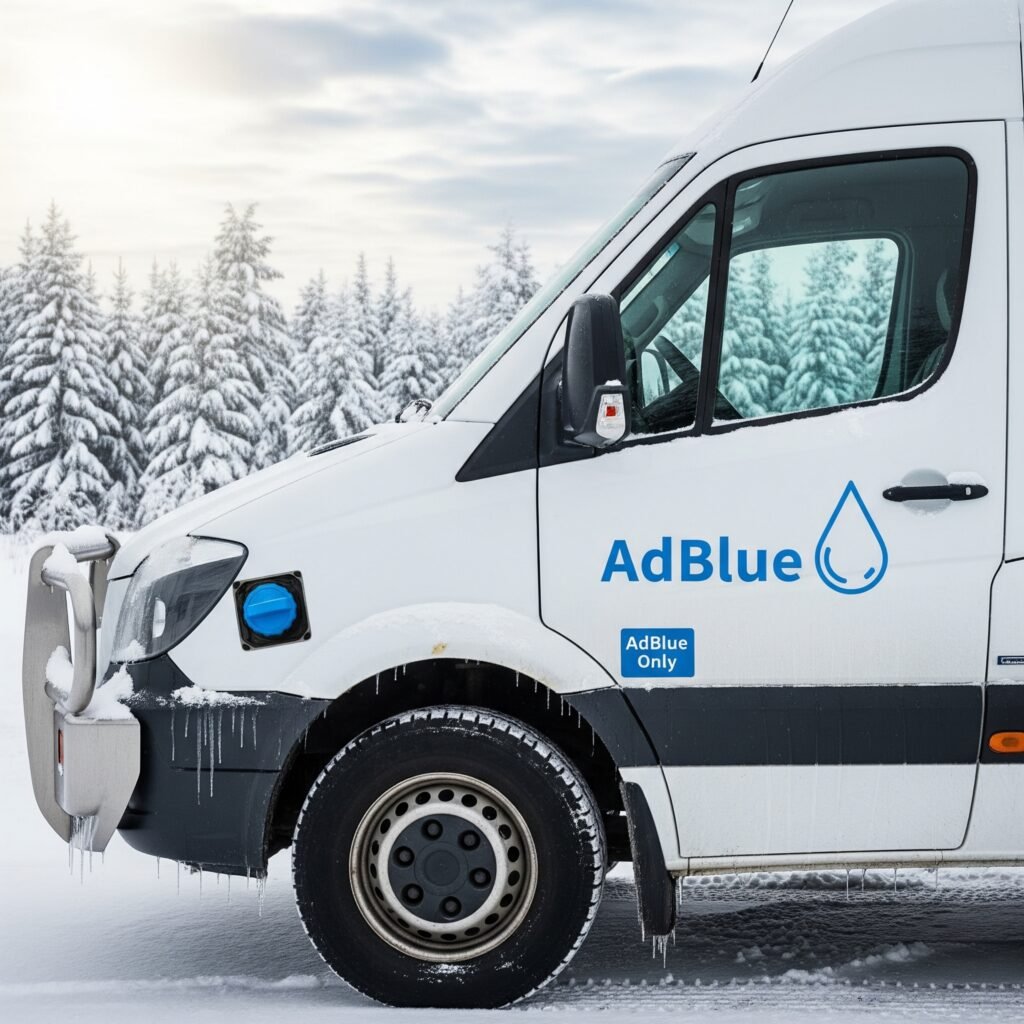Irish winters are harsh, and your fleet faces enough challenges without mechanical failures that could have been avoided. One issue that causes problems year after year is AdBlue crystallisation. It can bring your vehicles to a standstill, affect your compliance, and cost you money during your busiest season.
The good news is that it is entirely preventable if you take the right steps in advance.

What Causes AdBlue to Crystallise
AdBlue is a simple mixture of deionised water and urea. It plays a key role in reducing emissions by working with your vehicle’s Selective Catalytic Reduction system. However, it has one drawback. It freezes at minus eleven degrees Celsius.
When the temperature drops below this point, the water content starts to freeze and separates from the urea. This separation creates crystals that can cause serious issues throughout your AdBlue system.
Crystallisation can
- Block the AdBlue delivery lines
- Clog filters and nozzles
- Damage the SCR system
- Trigger dashboard warnings
- Result in downtime and repair costs
For businesses that rely on transport, this kind of disruption is more than inconvenient. It leads to missed jobs, delays for customers, and loss of revenue.
The Real Impact of Frozen AdBlue
When AdBlue crystallises, the results are immediate and expensive. Vehicles may become inoperable. Repairs are not always quick. A single failure can throw off your schedule for days.
You may need to call for emergency support. Drivers may be unable to complete their routes. Clients may turn to someone more reliable next time.
This is about more than fluid freezing in a pipe. It affects your operations, your income, and your reputation.
How to Stop AdBlue Crystallising in Winter
With a few simple steps, you can protect your AdBlue system and avoid these issues entirely. Here is what works in real Irish conditions.
Store AdBlue in a Heated and Insulated Tank
The first step is proper storage. Keep your AdBlue in a tank that is both heated and insulated. This prevents freezing and maintains consistent fluid quality.
Avoid placing containers outside or in exposed areas. If you store AdBlue in bulk, make sure the location is sheltered from wind and frost.
Heat the Entire Dispensing System
Warming the storage tank is important, but you also need to consider the transfer process. The fluid travels through hoses and pumps before it reaches the vehicle.
Use heated hoses and nozzles. Make sure the entire route from storage to vehicle stays above freezing. Look for systems with built-in thermostats or heating elements to ensure consistent performance.
Insulate All Pipes and Fittings
Exposed pipework is highly vulnerable in winter. Even short exposure to cold air can create blockages.
Wrap all pipes with thermal insulation. Use protective casings where needed. Pay particular attention to joints and fittings, as these are often the first points to fail in extreme conditions.
Use Equipment Designed for Cold Weather
Not all AdBlue equipment is made for winter use. Lower cost systems may lack insulation or heating features, leaving your vehicles at risk.
Choose systems from trusted manufacturers who offer cold weather protection as standard. Piusi is one such example, with proven solutions for harsh climates. These systems include built-in heating, insulation, and temperature control.
By choosing the right setup from the start, you reduce the need for emergency fixes later.
Carry Out Regular Maintenance Checks
Start inspecting your system before the cold weather arrives. Look for any signs of wear, cracking, or damage to insulation. Replace any parts that appear brittle or leaking.
Test heating elements and pumps. Ensure that everything is working efficiently and nothing is left to chance.
Continue checking the system regularly through the winter. Staying ahead of problems is always more cost effective than dealing with them after a failure.
Why You Should Act Before the Cold Arrives
Irish winters are unpredictable. One cold night is enough to crystallise AdBlue and cause system failure. If you are not prepared, it may already be too late by the time you notice a problem.
Taking a few small steps now means your fleet can continue operating throughout the season with no surprises.
You are not just protecting the fluid in a tank. You are protecting
- Fleet uptime
- Delivery schedules
- Driver productivity
- Customer expectations
- Your overall profit
A fully working AdBlue system means one less thing to worry about when things get busy.
Protect Your Fleet from Winter Delays
AdBlue crystallisation is preventable. With the right storage, heating and insulation, you can keep your system running smoothly even in freezing temperatures.
Focus on these core actions
- Use heated, insulated storage tanks
- Heat your entire dispensing system
- Insulate all pipework
- Choose reliable, cold weather equipment
- Inspect and maintain your system regularly
These changes are straightforward to implement and offer long term protection for your business.
If you are unsure which system is best for your needs, or want support choosing the right winter-ready solution for your fleet, get in touch today.
We will help you avoid the freeze and keep your vehicles moving all winter long.
